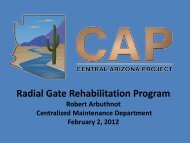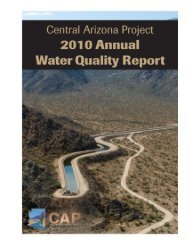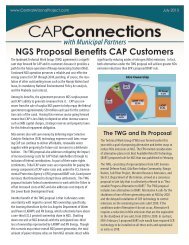Interview with Grady Gammage - Central Arizona Project
Interview with Grady Gammage - Central Arizona Project
Interview with Grady Gammage - Central Arizona Project
Create successful ePaper yourself
Turn your PDF publications into a flip-book with our unique Google optimized e-Paper software.
You are the presiding officer of the Board Meetings. It’s a little less than being a<br />
mayor because even in the <strong>Arizona</strong> system where we have weak mayor form of<br />
government, the mayor nevertheless is the presumptive spokesperson. Most<br />
people know who the mayor is. Nobody knows who the President of CAP is. It<br />
was mostly, you got to make some speeches, you got to cut some ribbons,<br />
although in the CAP example it’s turning a head gate. I have a good story about<br />
turning a head gate, I’ll tell you later. I spent a lot more time talking to the staff at<br />
that point and kind of trying to structure agendas and how policy decisions got<br />
brought to the Board. It’s an interesting…I’d thought before about trying to write<br />
something sometime about the interesting government lesson of a fairly narrowpurpose<br />
special unit of government like the <strong>Central</strong> <strong>Arizona</strong> <strong>Project</strong> that tends to<br />
make exceedingly technical and complex decisions. What tends to happen in<br />
that context is that the staff run everything because it is simply too hard for the<br />
Board to figure out what it is they need to know and what they don’t need to know<br />
in order to make the decisions they need to make. There is a tendency of some<br />
people to attempt to micromanage on a board like that, that’s extremely difficult<br />
<strong>with</strong> the technical level of questions that are presented or there’s a tendency to<br />
just kind of check out and go along <strong>with</strong> whatever the staff want to do and the<br />
CAP has a fabulous staff and most of the time, that’s fine. But there is a reason<br />
why there are elected people there to do something. There are a series of<br />
decisions that get made that really are policy decisions. They are not even<br />
political decisions in the sense that the public has no clue what these decisions<br />
are about. It’s not like you are deciding how to punish a crime or how to deal<br />
<strong>Interview</strong> <strong>with</strong> <strong>Grady</strong> <strong>Gammage</strong><br />
Page 31 of 91







